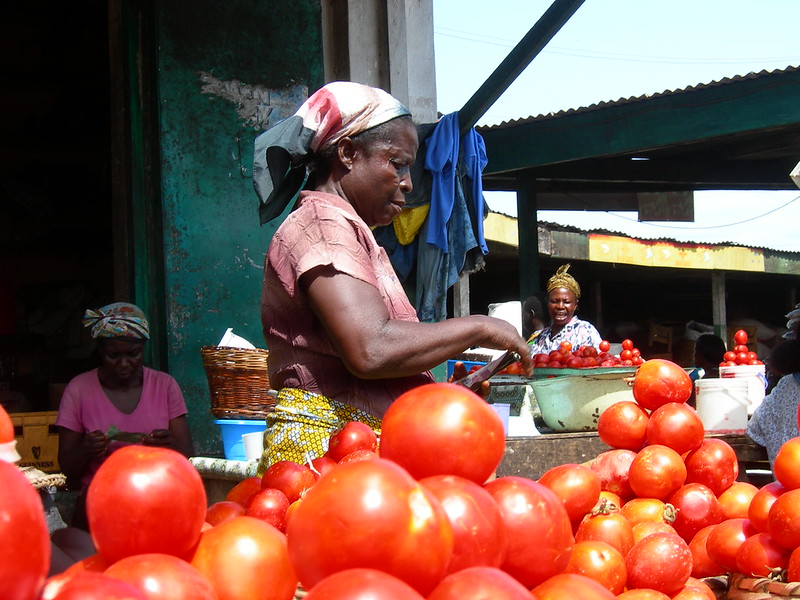From Makola to the Market: The Ghanaian Culture and Economy

Ghana’s economic struggles are multifaceted, but one of the most striking aspects is how the country’s cultural history and practices have shaped its modern economic landscape. For decades, Ghana has grappled with systemic failures, and the informal economy has reflected both resilience and a consequence of these failures. It is this informal sector that provides livelihoods for millions but also highlights the deep-rooted challenges that continue to hinder the country’s overall economic development. To understand Ghana’s future economic trajectory, we must first explore how culture, history, and governance are intricately tied to the country’s economic performance.
Historical Context and Cultural Influence
Ghana’s economy, like many African nations, has been deeply influenced by historical events such as colonialism, the slave trade, and the shift from a subsistence economy to one driven by cash crops and raw material exports. Post-independence, Ghana sought to industrialise and diversify its economy, but structural weaknesses – including reliance on the export of cocoa, gold, and oil – have remained. This economic model has left the country vulnerable to global commodity price fluctuations, often undermining efforts for sustainable growth. What’s more, despite periods of high economic growth, Ghana’s success in creating meaningful, long-term development has been limited, as evidenced by persistent unemployment, low industrialisation, and growing fiscal deficits.
Ghana’s historical context and current economic challenges are well documented by the World Bank. These weaknesses have undermined sustainable growth despite occasional economic booms. In the first half of 2024, Ghana’s GDP grew by 5.9%, up from 2.8% in 2023H1, driven by 8.1% growth in the industry sector, especially oil and gas. Agriculture expanded by 5.1%, despite a decline in cocoa, while services grew by 4.5%. Inflation decreased from 54.1% in December 2022 to 23.2% in December 2023, but disinflation slowed to 20.4% in August 2024 due to higher food prices and a depreciating cedi. The current account surplus rose to 1.5% of GDP, supported by strong remittances and reduced debt service payments, with reserves increasing from $5.9 billion to $6.9 billion. Fiscal performance was solid, with a primary deficit of 0.2% of GDP and an overall deficit lower than expected. Revenue and grants slightly underperformed, while expenditure was below target due to cuts. Debt restructuring deals worth $18.4 billion were finalized, and the banking sector showed resilience, with assets rising by 33.3%, though non-performing loans increased to 24.1%.
Yet, the country’s economic troubles are not simply the result of flawed policies or international economic shifts; they are also deeply embedded in Ghanaian culture. The informal sector, where millions work outside formal economic structures, has become a powerful symbol of the Ghanaian people’s resilience. People in this sector—small traders, artisans, and self-employed individuals—create their own opportunities where formal sector jobs are scarce. This culture of self-reliance, while admirable, also speaks to the broader issue that Ghana’s state has not been able to offer sufficient formal economic opportunities to its citizens.
The Informal Economy: A Reflection of Ghanaian Culture
The informal sector in Ghana is not just an economic reality, it’s a cultural one. It reflects the adaptability, creativity, and perseverance of Ghanaians in the face of systemic failures. However, the prominence of the informal sector also underscores a significant structural issue—the failure of the state to provide sufficient formal sector opportunities. The informal economy is built on a foundation of self-employment and entrepreneurship, where Ghanaians are finding their own solutions to economic challenges. This shift has allowed many to survive but at the cost of broader economic growth and development.
The informal sector represents not only an economic necessity but also a cultural attachment to independence and self-reliance. Historically, many Ghanaians were conditioned to see the state as ineffective and corrupt, which fueled their preference for operating outside the formal system. Today, this cultural attitude extends to the reluctance to engage with tax systems, often due to a lack of trust in government institutions. Many in the informal economy do not see themselves as part of the state’s formal economic structures, which further complicates efforts to integrate them into the broader national tax system.
The informal sector represents not only an economic necessity but also a cultural attachment to independence and self-reliance.
The informal economy is massive in Ghana, contributing to 80% of the country’s employment, according to the World Bank, with a significant portion of the workforce operating outside formal channels. This statistic highlights how crucial the informal sector is to the livelihoods of millions of Ghanaians, but also how difficult it will be to bring it into the formal economy. It’s clear that for Ghana’s economic future to improve, the informal sector must be addressed through a combination of policy changes, tax reforms, and cultural shifts.
The Debt and Tax Dilemma
Another major issue facing the Ghanaian economy is its burgeoning national debt. The country has undertaken significant debt restructuring efforts, including the Domestic Debt Exchange Program (DDEP) and agreements with bilateral and commercial creditors. As a result, Ghana has suspended debt repayments to these creditors until 2025. However, the government is expected to resume servicing its Eurobond debts in January 2025, with subsequent payments scheduled for July 2025. Additionally, the DDEP has altered the repayment terms of domestic debt, with interest payments set to begin in 2024 and increase to 10% from 2025 onwards. While these measures provide temporary relief, they also highlight the need for sustainable fiscal policies to manage the debt burden effectively.
But there’s a more fundamental issue at play: debt refinancing is a temporary fix. While it might offer short-term relief, it locks future generations into an ever-deepening cycle of borrowing. This approach is no longer viable in the long run. Ghana must shift its economic model from one reliant on debt to one driven by domestic revenue generation. The tax system, in particular, needs to be reformed and modernised to ensure that it taps into the potential of the informal economy, which, for now, remains outside the reach of the formal taxation system. The finance minister nominee’s proposals for improving tax compliance are a step in the right direction, but these changes must go beyond just increasing tax rates. They need to be culturally sensitive. Policies to bring the informal sector into the fold must take into account the entrenched cultural reluctance to engage with state-run systems. Incentives for formalizing the informal economy, such as simplified registration processes, access to credit, and tax breaks for small businesses, could help make the transition smoother. Until Ghana can address this cultural resistance to formalisation, it will continue to face significant barriers to building a tax system capable of supporting long-term development.
The World Bank also points out that Ghana’s tax-to-GDP ratio remains low, standing at 13.8% compared to the sub-Saharan African average of 16%. This gap underscores the immense potential for revenue generation that remains untapped, largely because of the informal sector’s exclusion from the formal tax system.
Empowering Local Communities: A Decentralised Approach
One key aspect of the new finance minister’s plan for the economy is decentralisation. During his vetting, the nominee emphasised the importance of devolving power to local governments, particularly the Metropolitan, Municipal, and District Chief Executives (MMDCEs). Decentralising economic decision-making to the local level is a strategic move to strengthen local governance, increase accountability, and ensure that the needs of communities are met more effectively.
The importance of local governance cannot be overstated. Decentralisation provides the opportunity to create more self-reliant communities that are better equipped to handle local economic challenges. Local governments are often more attuned to the needs of their communities and can make decisions that are better suited to their unique circumstances. By empowering local councils to manage resources, budget, and taxation, the government can improve efficiency, accountability, and public trust. It would also foster greater civic engagement, encouraging citizens to participate in the decision-making process and feel more connected to the economic outcomes that directly affect them. This approach to decentralisation can help break down some of the structural barriers that have hindered Ghana’s development. By shifting economic decision-making closer to the people, local governments can implement policies that are tailored to their specific needs, thereby addressing the shortcomings of a top-down, centralised system. Over time, this could lead to stronger local economies and more sustainable growth.
According to the World Bank, Ghana’s economy remains heavily centralised, with decision-making and resource allocation largely controlled by the central government. This centralisation has often led to inefficiencies and a disconnect between the government and local communities. Decentralisation could alleviate these problems and ensure that resources are more effectively distributed to where they are most needed.
A Cultural Shift Towards Formalisation and Economic Growth
For Ghana’s economy to grow and stabilise, it must tackle the deep cultural issues that have shaped its economic practices. The informal economy, while resilient, is not sustainable in the long term. Bringing it into the formal system requires a cultural shift—one where Ghanaians see the benefits of engaging with the state-run systems and contributing to national development. For this to happen, the government must prove its trustworthiness by delivering tangible improvements in public services and infrastructure. A key part of this transformation lies in decentralisation. Empowering local governments and communities to make decisions about their economic future will foster greater engagement with the formal economy. Moreover, decentralisation can help break the cycle of corruption and inefficiency that has plagued the central government, giving local people the tools they need to build their own economic resilience.
Ghana’s economy’s future depends on addressing the cultural and structural issues that have hindered its development. By focusing on improving tax compliance, formalising the informal economy, and decentralising decision-making, Ghana can begin to build a more sustainable and inclusive economic future—one that benefits all its citizens and fosters long-term prosperity. Without these changes, the country will remain stuck in a cycle of debt, political instability, and underdevelopment, no matter how much fiscal wizardry is employed.
Feature photo by Caroline Beaumont

